
The Two Clematis Plants of Dyke Marsh
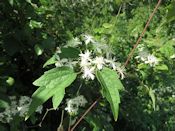
A stand of native clematis, Clematis Virginiana, has been growing on a shrub along the “long bridge” (bridge 23) in Dyke Marsh on the Mount Vernon Trail. This is not the same as the non-native clematis that FODM “weed whackers” try to control, a plant called sweet autumn clematis or Clematis Terniflora.
Project to Slow Stormwater Pollution Is Completed
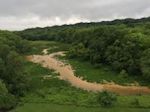
On July 1, 2017, several FODMers and members of the Westgrove PACK (Pumphouse Association for Canine Kindness), the dog park friends’ group, visited the completed Quander Road outfall project, west of the dog park and Dyke Marsh West.
Cautious Hope for Marsh Wrens
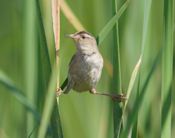
This year, 2017, there seem to be more marsh wrens (Cistothorus palustris) occupying the Dyke Marsh Wildlife Preserve than at any time since 2014 when FODMers last recorded this bird as a breeder. Data from volunteers this year suggest there may be as many as five territorial males in the marsh. This does not necessarily mean the population is recovering. Avian males appear more willing to occupy degraded or marginal habitats than females and, sadly, we have had no reports of females alone or as part of a breeding pair in Dyke Marsh since 2014.
Ecology Walk in Dyke Marsh
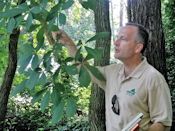
It was all about geology, plants, forests, wetlands, uplands, birds, mammals, reptiles, insects, how everything interrelates and more on the June 10, 2017, ecology walk with Charles Smith, expert naturalist and Chief of Fairfax County’s Stormwater Planning Division, Watershed Projects Implementation Branch.
Conservation Connections with Belle View Elementary School
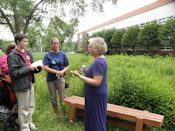
One of Dyke Marsh’s neighbors, the Belle View Elementary School, has created outdoor classrooms over the last ten years which help restore and support our natural resources, including the Dyke Marsh Wildlife Preserve.
The 600-student school is just west of Dyke Marsh West. What happens upstream has effects downstream, especially for water quality. For species like birds, moths and butterflies that move throughout the environment, creating some natural connectivity and supportive habitat can be very important.
“Our” Ospreys
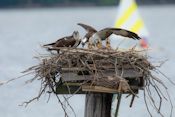
An osprey (Pandion haliaetus) family near the boat ramp of the Belle Haven Marina has provided fans and photographers many prime raptor-watching opportunities this spring, 2017. The two adults are raising three young.
Maryland Elementary Students Study Beetles and More in Dyke Marsh
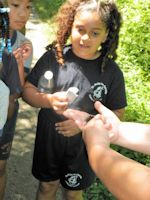
Rising third graders from St. Philip the Apostle Catholic School, Camp Springs, Maryland, were intrigued by the black “patent leather” beetle or horned passalus (Odontotaenius disjunctus), during their June 1, 2017, visit. NPS Ranger Mireya Pasa urged the youngsters to touch the beetle and pointed out the insect’s distinctive mandibles.
More Native Plants and Trees Help Restore Dyke Marsh
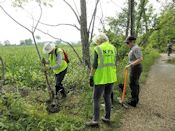
On May 31, 2017, eight enthusiastic FODMers planted another 30 native shrubs and trees along the Haul Road trail east of the “dogleg” turn along the trail, led by NPS staffers Melissa Westbrook and Colin Davis. This planting was in addition to the 40 plants put in on April 25, 2017.
Group Studies Biodiversity in Dyke Marsh
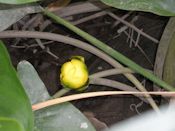
On May 20, 2017, a class led by Joel Cohen, Audubon Naturalist Society, visited the Dyke Marsh Wildlife Preserve to study biodiversity. A common wetland plant in the marsh, spatterdock (Nuphar polyspala), was in bloom, sporting its bright yellow, golf-ball-like flower.
FODM at the Eagle Festival
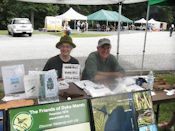
On May 20, 2017, FODM exhibited at the 20th annual Mason Neck Eagle Festival. Glenda Booth and Marc Ribaudo, pictured here, staffed the table in the afternoon; Ned Stone and Trudi Hahn, in the morning. A steady stream of youngsters made colorful birds at the FODM table and a “foxy” ranger visited.
Periodic Cicadas Are Emerging
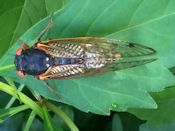
On May 14, 2017, FODMers saw periodic cicadas, genus Magicicada, emerging in Dyke Marsh, moreso in west Dyke Marsh, but definitely on both sides of the George Washington Memorial Parkway.
Observers may see the insects’ shed nymphal skins at the base of trees. Unlike the cicadas that appear annually in Dyke Marsh (swamp, Robinson’s, Linne’s, scissor-grinder and others), the periodic cicadas appear much less frequently.
Common Watersnakes Spotted
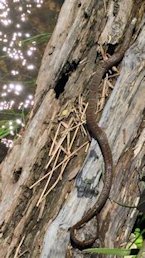
On May 14, 2017, FODMers observed several common or northern watersnakes (Nerodia sipedon sipedon) off both sides of the boardwalk. These snakes are more active on sunny days than on cloudy days and are known to mate near the water's edge on logs, over rocks or on branches. Their coloration helps them camouflage, but movement in the cattails may give away their presence.


AlbertHerring-b4cc6b5cfb.jpg)



 Friends of Dyke Marsh, Inc. is a non-profit 501(c)(3) organization.
Friends of Dyke Marsh, Inc. is a non-profit 501(c)(3) organization.